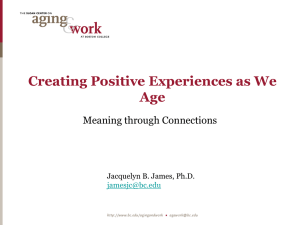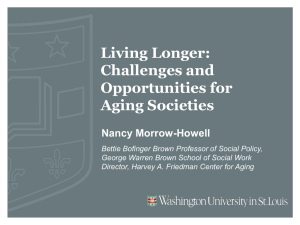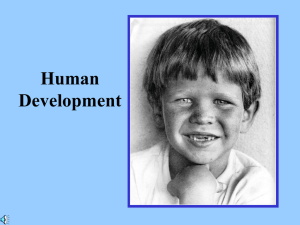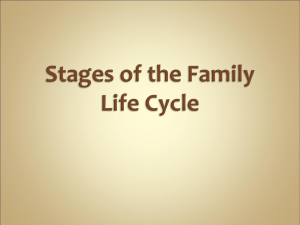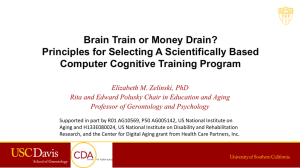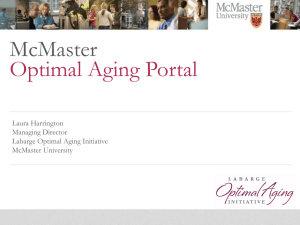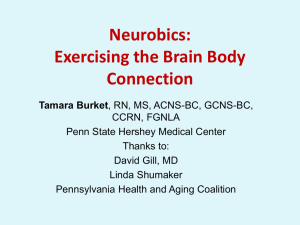Ms. Baum PPT
advertisement
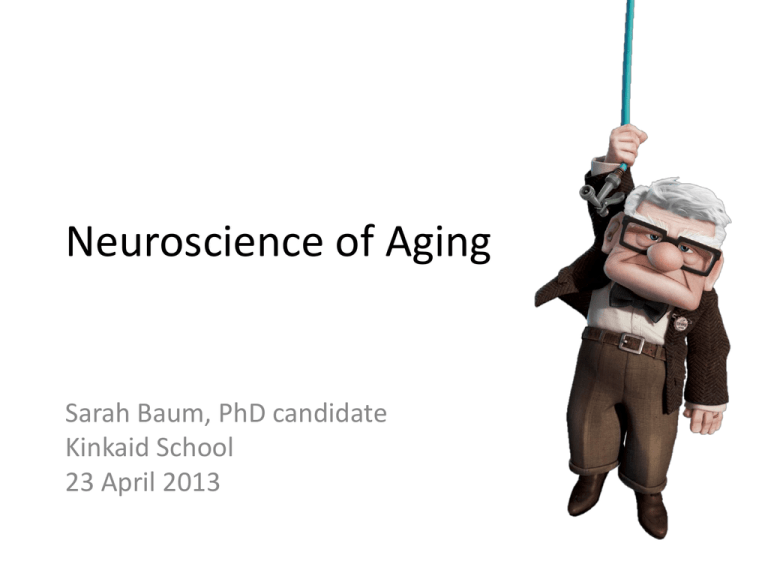
Neuroscience of Aging Sarah Baum, PhD candidate Kinkaid School 23 April 2013 Outline • Physical changes in the aging brain – Gray matter changes – White matter changes – Pathological aging • Cognitive changes in the aging brain – General slowing – Increased variability – Do brain games really work? Physical changes in the aging brain Physical Changes in the aging brain • Even with healthy aging, there are a number of physical changes that occur in the aging brain – How these changes are related to cognitive changes is not always known Physical Changes in the aging brain • Thinning of the cortex Fjell AM, Westlye LT, Amlien I, Espeseth T, Reinvang I, Raz N, Agartz I, Salat DH, Greve DN, Fischl B, Dale AM and KB Walhovd (2009). High Consistency of Regional Cortical Thinning in Aging across Multiple Samples. Cerebral Cortex 19:2001-2012. Physical Changes in the aging brain • Thinning of the cortex: last in, first out? Physical Changes in the aging brain • White matter integrity declines with age Bartzokis G, Cummings JL, Sultzer D, Henderson VW, Neuchterlein KH and Minz J (2003). White Matter Structural Integrity in Healthy Aging Adults and Patients with Alzheimer Disease. Archives of Neurology 60(3):393-398. Physical Changes in the aging brain • Loss of neuronal plasticity – The ability to alter how our neurons are connected is thought to be how memory is physically stored in the brain – The brain’s ability to change structure and function is decreased in the aging brain Physical Changes in the aging brain • Morphology of neurons in the cortex of an older and younger rhesus macaque monkey Hof PR and JH Morrison (2004). The aging brain: morphomolecular senescence of cortical circuits. TRENDS in Neurosciences 27(10). Physical Changes in the aging brain • Certain diseases can also occur in the aging brain, which are associated with certain physical changes in the brain Physical Changes in the aging brain • Alzheimer’s disease occurs in approximately 11% of adults 65 and older – Cannot officially be diagnosed without an autopsy – In 2013 Alzheimer’s will cost $203 billion in the US • Costs to Medicare/Medicaid and unpaid care provided by family and friends of people living with Alzheimer’s – Currently very few options for treatment Physical Changes in the aging brain http://pakmed.net/academic/age/alz/plaques_tanglesBorder.jpg Physical Changes in the aging brain http://www.alz.org/braintour/healthy_vs_alzheimers.asp Cognitive changes in the aging brain Cognitive changes in the aging brain Park DC and Bischof GN (2013). The aging mind: neuroplasticity in response to cognitive training. Dialogues in Clinical Neuroscience 15(1):109119 Cognitive changes in the aging brain • Older adults’ performance is often not only poorer than younger adults’, but also more variable (inconsistent) – This increased variability has been observed both on a behavioral level and on a neuronal level – Not clear how neuronal and behavioral variability are related Cognitive changes in the aging brain • Increased variability in older adults Hultsch DF, MacDonald SWS, Dixon RA (2002). Variability in Reaction Time Performance of Younger and Older Adults. Journal of Gerontology 57B:P101P115 Cognitive changes in the aging brain • The Nun Study – Began in 1986 focusing on 678 Roman Catholic sisters to study the onset of Alzheimer’s disease – Examined autobiographical essays written by the nuns before joining the sisterhood (~ 22 yrs old) • Linguistic density (more complex sentences, fluency) significantly predicted risk of developing Alzheimer’s Riley KP, Snowdon DA, Desrosiers MF, Markesbery WR (2005). Early life linguistic ability, late life cognitive function, and neuropathology: Findings from the Nun Study. Neurobiology of Aging 26(3):341347 Brain games: do they work? Do brain games work? • It is possible to train yourself to improve performance on certain tasks – Do these results transfer? Do brain games work? • “Brain-training programs promise even more– these programs are purported to enhance and ‘rewire’ the brain to make it better than ever… Nearly all of these claims are, at best, overly optimistic, and, at worst, blatant charlatanism.” Park DC and Bischof GN (2013). The aging mind: neuroplasticity in response to cognitive training. Dialogues in Clinical Neuroscience 15(1):109119 Do brain games work? • “It is only when an individual experiences substantial and sustained demands on their cognitive system that plasticity will manifest itself.” Park DC and Bischof GN (2013). The aging mind: neuroplasticity in response to cognitive training. Dialogues in Clinical Neuroscience 15(1):109119 Do brain games work? • Best results occur when using and developing critical thinking skills, creativity – Senior Odyssey • • • • Frequent exposure to ill-defined problems Collaborative context Competition Emphasis on creativity Stine-Morrow, E. A. L., Parisi, J. M., Morrow, D. G., & Park, D. C. (2008). The effects of an engaged lifestyle on cognitive vitality: a field experiment. Psychology and Aging, 23(4), 778–786 Changes in the aging brain • Suggested reading: – The Brain that Changes Itself, Norman Doidge MD Thank you!

